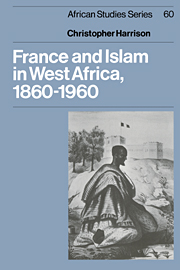Book contents
- Frontmatter
- Contents
- Acknowledgements
- Abbreviations
- Map
- 1 Introduction
- PART I 1850–1898: NINETEENTH-CENTURY ORIGINS OF FRENCH ISLAMIC POLICY
- PART II 1898–1912: THE FEAR OF ISLAM
- PART III FRENCH SCHOLARSHIP AND THE DEFINITION OF ISLAM NOIR
- Introduction
- 6 Scholar-administrators and the definition of Islam noir
- 7 The First World War
- PART IV 1920–1940: THE FRENCH STAKE IN ISLAM NOIR
- Notes
- Bibliography
- Index
- Frontmatter
- Contents
- Acknowledgements
- Abbreviations
- Map
- 1 Introduction
- PART I 1850–1898: NINETEENTH-CENTURY ORIGINS OF FRENCH ISLAMIC POLICY
- PART II 1898–1912: THE FEAR OF ISLAM
- PART III FRENCH SCHOLARSHIP AND THE DEFINITION OF ISLAM NOIR
- Introduction
- 6 Scholar-administrators and the definition of Islam noir
- 7 The First World War
- PART IV 1920–1940: THE FRENCH STAKE IN ISLAM NOIR
- Notes
- Bibliography
- Index
Summary
After the fiasco of the Goumba affair both the French and – as Sheikh Sankoum's poem bears witness – the Fulbe appear to have gone in for some soul-searching. The third part of this study describes the first wave of considered intellectual reflection by the French about the nature of their presence in West Africa. By the First World War some administrators had already acquired considerable knowledge of indigenous societies and during the war years themselves this knowledge increased beyond all reasonable expectation as a result of research initiatives from within the colonial administration. Three men in particular were responsible for this burst of activity: FranÇois Clozel, Maurice Delafosse and Paul Marty. Although all three operated from within and for the benefit of the colonial system, all nonetheless contributed to a liberal understanding of African society which has been hugely influential amongst both European and African policy-makers. Within this liberal understanding Islam occupied a central position: largely as a result of the wartime scholarship of Clozel, Delafosse and Marty, the nature of Islam was redefined and accommodated within an understanding of African culture which emphasised the power of ethnically specific ‘traditions’ in shaping society. The French definition of Islam noir as a religion which was quite distinct from the type of Islam practised elsewhere in the Muslim world acquired a particular significance in the context of a war in which the enemy forces included the Ottoman Empire.
- Type
- Chapter
- Information
- Publisher: Cambridge University PressPrint publication year: 1988

